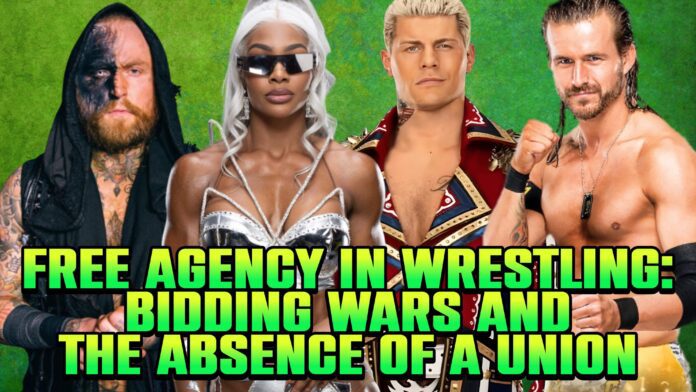Free agency in professional wrestling has become an increasingly prominent aspect of the industry, allowing wrestlers to negotiate contracts and explore opportunities across different promotions. This essay will examine the concept of free agency in wrestling, focusing on the emergence of bidding wars for talented wrestlers and the absence of a union. We will explore the positives and negatives of these developments, shedding light on the unique dynamics of the wrestling industry.
1. Bidding Wars in Wrestling
a. Increased Market Demand: With the growth of the wrestling industry, there is heightened demand for talented wrestlers across multiple promotions. This has led to bidding wars as companies seek to secure top talent, resulting in higher salaries and greater exposure for performers.
b. Negotiating Power for Wrestlers: Bidding wars provide wrestlers with increased bargaining power, enabling them to negotiate more favorable contracts. It allows them to explore different opportunities, experience creative freedom, and potentially increase their earnings by leveraging competing offers.
c. Promotional Competition: Bidding wars between wrestling promotions create a competitive environment that drives innovation, forces promotions to invest in talent development, and provides fans with fresh matchups and exciting rivalries.
2. The Absence of a Union:
a. Limited Collective Bargaining Power: The absence of a union in wrestling means that wrestlers do not have collective bargaining power. This can leave wrestlers vulnerable to unfavorable working conditions, limited healthcare benefits, and inadequate job security.
b. Creative Constraints: Without a union, wrestlers may have limited input in creative decisions and character development. They may be subjected to predetermined storylines, hindering their ability to showcase their full potential and connect with audiences on a meaningful level.
c. Financial Inequality: The absence of a union can exacerbate financial disparities between wrestlers. Top-tier performers may negotiate highly lucrative contracts, while mid-card and lower-tier talent face significant challenges in securing stable employment and fair compensation.
3. The Role of Independent Contractors:
a. Entrepreneurial Opportunities: Wrestling’s independent contractor model offers wrestlers the opportunity to build their own brand and explore entrepreneurial ventures outside of in-ring competition. This can include merchandise sales, endorsement deals, and appearances on various platforms.
b. Greater Flexibility: Independent contractor status allows wrestlers to work for multiple promotions simultaneously, providing greater flexibility in scheduling and creative pursuits. This freedom enables wrestlers to experiment with different styles and perform in front of diverse audiences.
c. Lack of Traditional Employment Benefits: Due to their status as independent contractors, wrestlers are often responsible for their own healthcare, retirement planning, and financial security. They do not receive traditional employment benefits typically granted to employees in other industries.
Positives and Negatives of Free Agency in Wrestling:
a. Positives:
– Increased opportunities and exposure for wrestlers.
– Competitive bidding wars leading to better financial prospects.
– Creative freedom and the ability to explore different promotions.
b. Negatives:
– Lack of collective bargaining power and representation for wrestlers.
– Limited input in creative decisions and character development.
– Financial inequality and potential exploitation of lower-tier talent.
Conclusion
The emergence of free agency and bidding wars in wrestling has brought about significant changes in the industry, offering both opportunities and challenges for wrestlers. While bidding wars allow performers to negotiate better contracts and gain exposure, the absence of a union leaves wrestlers without collective bargaining power and exposes them to potential exploitation. Wrestlers must navigate the unique environment of the wrestling industry, leveraging their entrepreneurial opportunities while wrestling promotions and talent alike must consider the importance of fair representation and equitable treatment. By acknowledging and addressing these challenges, the wrestling industry can strive towards creating a more inclusive, fair, and prosperous environment for all involved.







